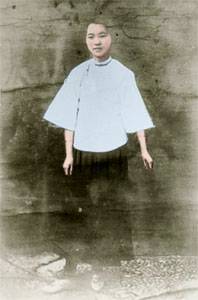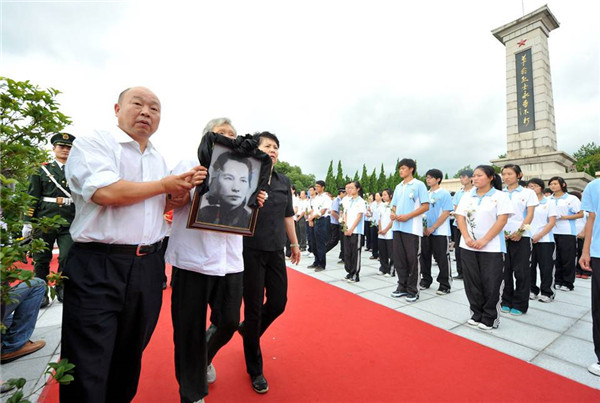Walking through the southeast corner of Ningbo Zhenhai Middle School, a unique two-story red building surrounded by an idyllic scene comes into our view. The red building, while on the campus, is neither a teaching building, nor a laboratory.
Who is the owner of the little red chamber? At the entrance of this garden, we found the answer. On the yellowing white wall, the words "former residence of martyr Zhu Feng" are engraved.
The house, named Qi Yuan, is formerly known as "Zhu's garden" and is where Zhu Feng, a legendary intelligence agent working for the Communist Party of China, was raised. In 1992, after the expansion of Zhenhai Middle School, the place where Zhu Feng used to live was preserved and renovated. It was assigned to the school and a memorial building was built to inspire future generations.
In 1905, Zhu Feng was born in a mansion in Zhenhai, Ningbo. Her father, Zhu Yunshui, was the president of Zhenhai's fishery association, and her mother was the daughter of a rich merchant who was a fishery "customs broker". In Zhenhai, the Zhu family was famous. Zhu Feng was proficient in poetry, calligraphy and painting, and her calligraphy was taught by the great calligrapher Mr. Sha Menghai.
As a student, Zhu Feng took part in the vigorous anti-imperialist patriotic movement and was enlightened by the revolution. In 1937, the July 7th incident broke out in an all-round way. At the time of national salvation, Zhu Feng resolutely broke with her family, and sold her property to make revolutionary donations several times, and organized charity fundraising shows and sales activities to seek relief for refugees. During this period, Zhu Feng married Communist Zhu Xiaoguang and embarked on her revolutionary journey.
In 1944, Zhu Feng was ordered to work secretly for the party in Shanghai, and joined the Tongfeng Commercial Firm during its establishment by the Shanghai Office of Xinzhi bookstore and was in charge of the business. Xinzhi bookstore was not only the cultural base of the Communist Party of China, but also the secret transfer station of the party.
In October of the same year, Shanghai Xinzhi Bookstore was infiltrated by one of the secret agents of Wang Jingwei’s puppet regime, and Zhu Feng along with other colleagues were exposed, arrested and jailed. In the face of torture, Zhu Feng kept her mouth shut and was later rescued by the party. Unexpectedly, after escaping from prison, she sneaked back into the sealed shop and took out her deposit, check book and account book. The money Zhu Feng took out at great risk provided the transportation expenses for the comrades released later.

Zhu Feng officially joined the Communist Party of China secretly in the spring of 1945.
In order to break through the economic blockade of the KMT national government, the party needed to expand its efforts in urban finance to support the revolutionary cause. Amid this background, "Tinkle Bank" emerged and served as a financial lifeline for Shanghai to help liberated areas across the nation.
Zhu Feng, who was born into a merchant family, was very good at financial management and became the best person to manage the secret "bank" of the party at that time.
In 1945, Zhu Feng was transferred from the bookstore system to work in Lianfenghua Gauze Company and Tinkle Bank, the commercial institutions of the East China Bureau of the Communist Party of China in Shanghai. She was in charge of Finance and the funding of the Intelligence Department of the Communist Party of China at that time. She used her legal identity and upper social relations to collect intelligence and as a cover for revolutionary comrades.
When working in Lianfenghua Gauze Company, Zhu Feng's public identity was financial accounting director. In order to open up the market of products, Zhu Feng personally led the supply and marketing personnel to go to the market to buy white cloth at a low price, then dyed them, and sold them under their brand.
In 1946, Tinkle Bank began to be set up in Shanghai. At that time, Tinkle Bank was ostensibly engaged in financial business such as bill exchange, but it was actually a secret bank and "hub" of the party. The following year, Tinkle Bank officially opened its business on Sichuan Road near the intersection of Dianchi Road in Shanghai. Relying on the capital support of Tinkle Bank, a large number of scarce military supplies were secretly transported to the liberated areas. As the public representative of Tinkle Bank, Zhu Feng was in charge of finance.
At that time, in addition to doing a good job in the Lianfenghua Gauze Company and Tinkle Bank, Zhu Feng had to skillfully deal with the complicated interpersonal relationship between the financial circles in Shanghai and the upper class of the Kuomintang party, government and army, secretly obtaining intelligence, and protecting the party's cause and the safety of comrades.
According to a senior executive of Dingyuan bank, before the founding of new China, there was a deputy general manager of the puppet Shanghai Municipal Bank who helped the capital turnover of Dingyuan bank a lot and had contacts with many senior officers of the Kuomintang. Zhu Feng further taught the senior executive to lose some money to senior KMT officials he knew when gambling with them, so as to make them happy. When they got familiar with each other, she used the relationship to inquire about some intelligence information. Through reasonable operations, Zhu Feng carefully managed every penny of the party's wealth.

In November 1949, after the founding of new China, Zhu Feng went to Taiwan alone to engage in intelligence work. During his stay in Taiwan, Zhu Feng sent back a large number of extremely important top secret military intelligence. At the beginning of 1950, when Zhu Feng was about to return to the mainland, Cai Xiaoqian defected and as a result Zhu Feng was arrested and died in Taipei.
Before her execution, Zhu Feng shouted "Long live the Communist Party of China!" and her voice resounded through the sky. After 60 years in Taiwan, Zhu Feng's remains were taken back to the mainland in 2011. The next year, Zhu Feng's ashes were sent back to his hometown Ningbo and placed in Zhenhai Martyrs Cemetery.
